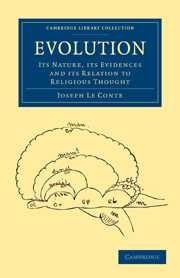Book contents
- Frontmatter
- PREFACE TO THE SECOND EDITION
- PREFACE TO THE FIRST EDITION
- Contents
- PART I WHAT IS EVOLUTION?
- PART II EVIDENCES OF THE TRUTH OF EVOLUTION
- PART III THE RELATION OF EVOLUTION TO RELIGIOUS THOUGHT
- CHAPTER I INTRODUCTORY
- CHAPTER II THE RELATION OF EVOLUTION TO MATERIALISM
- CHAPTER III THE RELATION OF GOD TO NATURE
- CHAPTER IV THE RELATION OF MAN TO NATURE
- CHAPTER V THE RELATION OF GOD TO MAN
- CHAPTER VI THE OBJECTION THAT THE ABOVE VIEW IMPLIES PANTHEISM, ANSWERED
- CHAPTER VII SOME LOGICAL CONSEQUENCES OF THE DOCTRINE OF THE DIVINE IMMANENCY
- CHAPTER VIII RELATION OF EVOLUTION TO THE IDEA OF THE CHRIST
- CHAPTER IX THE RELATION OF EVOLUTION TO THE PROBLEM OF EVIL
- Index
CHAPTER VIII - RELATION OF EVOLUTION TO THE IDEA OF THE CHRIST
Published online by Cambridge University Press: 29 August 2010
- Frontmatter
- PREFACE TO THE SECOND EDITION
- PREFACE TO THE FIRST EDITION
- Contents
- PART I WHAT IS EVOLUTION?
- PART II EVIDENCES OF THE TRUTH OF EVOLUTION
- PART III THE RELATION OF EVOLUTION TO RELIGIOUS THOUGHT
- CHAPTER I INTRODUCTORY
- CHAPTER II THE RELATION OF EVOLUTION TO MATERIALISM
- CHAPTER III THE RELATION OF GOD TO NATURE
- CHAPTER IV THE RELATION OF MAN TO NATURE
- CHAPTER V THE RELATION OF GOD TO MAN
- CHAPTER VI THE OBJECTION THAT THE ABOVE VIEW IMPLIES PANTHEISM, ANSWERED
- CHAPTER VII SOME LOGICAL CONSEQUENCES OF THE DOCTRINE OF THE DIVINE IMMANENCY
- CHAPTER VIII RELATION OF EVOLUTION TO THE IDEA OF THE CHRIST
- CHAPTER IX THE RELATION OF EVOLUTION TO THE PROBLEM OF EVIL
- Index
Summary
What think ye of Christ? This is indeed in many ways a test-question, and we ought frankly to meet it. I have feared heretofore to touch this question. I now only throw out some brief suggestions—scatter some seed-thoughts. Does Evolution have anything to say on this also? I think it does. This I proceed to show:
As organic evolution reached its goal and completion in man, so human evolution must reach its goal and completion in the ideal man—i.e., the Christ. According to this view, the Christ is the ideal man, and therefore —(mark the necessary implication)—and therefore the Divine man. We are all as men (as contradistinguished from brutes)—we are all, I say, sons of God; the Christ is the well-beloved Son. We are all in the image of God; he is the express and perfect image. We are all partakers in various degrees of the Divine nature; in him the Divine nature is completely realized. It is not necessary that the ideal man—the Christ—should be perfect in knowledge or in power; on the contrary, he must grow in wisdom and in stature, like other men; but he must be perfect in character. Character is essential spirit. All else, even knowledge, is only environment for its culture. In the dazzling light of modern science we are apt to forget this.
- Type
- Chapter
- Information
- EvolutionIts Nature, its Evidences and its Relation to Religious Thought, pp. 360 - 364Publisher: Cambridge University PressPrint publication year: 2009First published in: 1898



